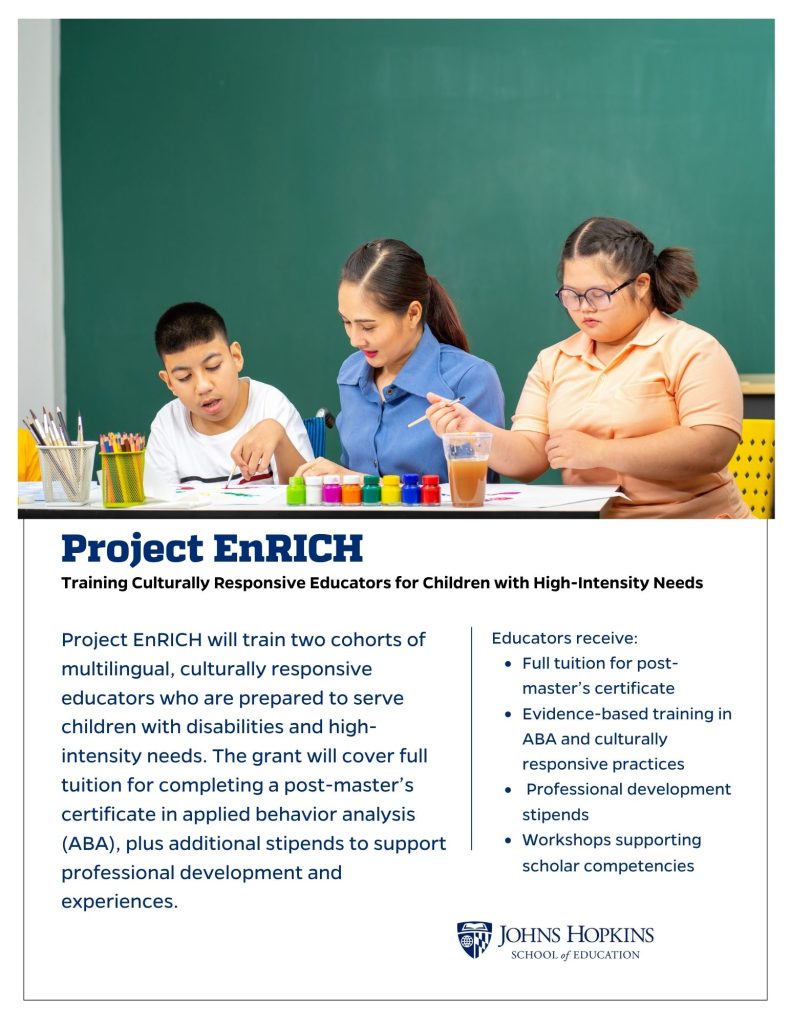Children thrive in learning environments that address their educational, social, emotional, and physical needs. Currently, schools struggle to find highly trained personnel to support the education of children with disabilities and high-intensity needs from racially and ethnically diverse backgrounds. Establishing and sustaining these learning practices has been made especially difficult by school closures during the coronavirus pandemic and the current shortage of related services personnel within schools.
 To address these significant challenges, Associate Professor Tamara Marder, PhD, and Assistant Professor Alexandra Shelton, PhD, from the Johns Hopkins School of Education have secured a $1 million, five-year grant from the U.S. Department of Education to train related service providers in schools (e.g., school psychologists, special educators, speech and language pathologists, behavior specialists) with specialized knowledge and skills in applied behavior analysis (ABA) and culturally responsive, evidence-based practices.
To address these significant challenges, Associate Professor Tamara Marder, PhD, and Assistant Professor Alexandra Shelton, PhD, from the Johns Hopkins School of Education have secured a $1 million, five-year grant from the U.S. Department of Education to train related service providers in schools (e.g., school psychologists, special educators, speech and language pathologists, behavior specialists) with specialized knowledge and skills in applied behavior analysis (ABA) and culturally responsive, evidence-based practices.
This initiative, called Project EnRICH, aims to train a group of multilingual scholars to enhance their readiness to serve children with disabilities and high-intensity needs from diverse cultural backgrounds. The grant will cover full tuition for 15 scholars completing a post-master’s-certificate in ABA, plus additional stipends to support professional development and experiences. Scholars will also have access to advanced academic workshops that supplement the course work throughout the program.
Each step of the way, Project EnRICH will provide training and ongoing support and promote the development of target competencies all while ensuring program retention and program completion. The training and support provided will prepare graduates to deliver high-quality, equity-centered instruction and interventions in school-based settings.
At the conclusion of Project EnRICH, scholars will have transformed into leaders with strengthened competencies in culturally responsive practices and ABA through both coursework and supervised fieldwork, matching national certification standards outlined by the Behavior Analyst Certification Board. Additionally, they will have gained a skillset that enables them to meet unique educational needs and improve outcomes for a diverse body of students. Upon completion of the post-master’s-certificate and supervised fieldwork, scholars will be eligible to apply to the Behavior Analyst Certification Board to become a Board Certified Behavior Analyst® (BCBA).
“We are excited to have the opportunity to address these critical needs in schools and to incorporate culturally responsive practices within training in ABA,” says Marder, who is also the program director for Project EnRICH. “This is a great need within the field of ABA, and we are looking forward to the opportunity to further advance our ABA graduate program so that we may continue in our goal of providing high-quality training to future, school-based BCBAs.”
